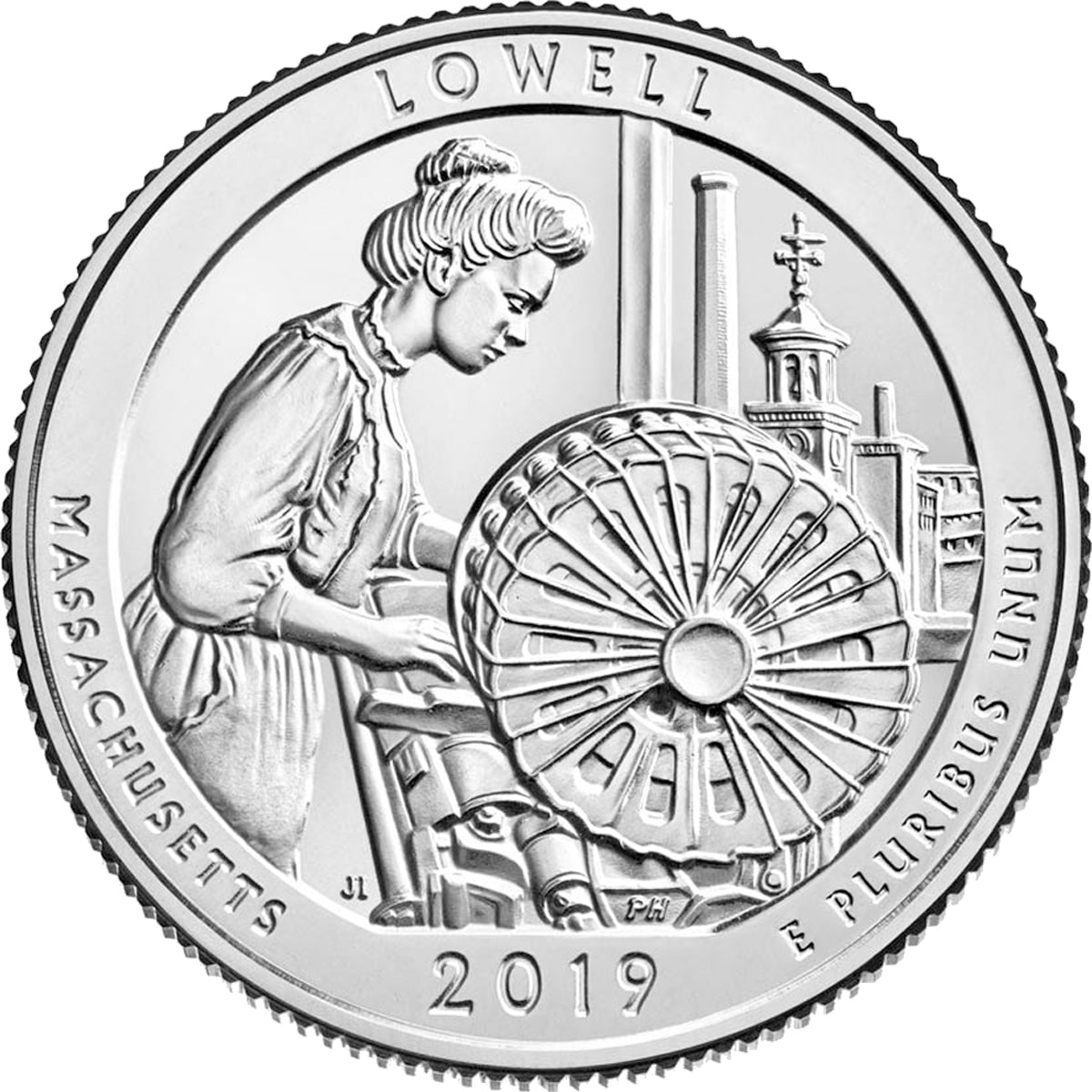Colonial Acres Coins
SKU: SKU:Single-2019.Lowell.P
2019-P Lowell (Massachusetts) USA National Parks Quarter Uncirculated (MS-60)
2019-P Lowell (Massachusetts) USA National Parks Quarter Uncirculated (MS-60)
Regular price
$0.75
Regular price
$0.85
Sale price
$0.75
Unit price
per
We buy at $0.00
◎ 13 Available
Couldn't load pickup availability

FREE SHIPPING OVER $500
2019 P Lowell USA National Parks Quarter Uncirculated (MS-60)
The Lowell National Historical Park quarter is the first in 2019 and 46th overall in the America the Beautiful Quarters Program. Established in 1978, Lowell National Historical Park preserves and interprets the role of Lowell, MA, in the Industrial Revolution in America, mainly during the 1820s and 1830s. The park archives the history of the human story in addition to the industry processes and cultural environment of the time.
The nearly six miles of canals and waterways dug to provide power to the textile mills were of vital importance and nearly all are still in existence. Dependent on this water power, the first "integrated" textile mill (a mill with all operations under one roof) was built in Lowell. This factory represented a new type of mill—an operation with large scale equipment, no longer dependent on the spinning wheel and individual artisans to create fabric. This change revolutionized the way cloth was manufactured and exemplified the changes to manufacturing that were realized during the Industrial Revolution.
The era was also defined in part by the "Mill Girls," young women who were recruited to work in the mills where they earned cash wages and lived in supervised, company-owned boarding houses. Coming mostly from New England farms, the girls signed on to the mills for work for a designated period of time. This female workforce was critical to the textile industry for many years. As a group, they became an important voice for labor by: advocating for better working conditions through the first Lowell strike in 1834 and the 10-hour work day movement supporting abolitionism embracing education. The reverse (tails) design depicts a mill girl working at a power loom with its prominent circular bobbin battery. A view of Lowell, including the Boott Mill clock tower is seen through the window, inscriptions are "LOWELL," "MASSACHUSETTS," "2019," and "E PLURIBUS UNUM."
The Lowell National Historical Park quarter is the first in 2019 and 46th overall in the America the Beautiful Quarters Program. Established in 1978, Lowell National Historical Park preserves and interprets the role of Lowell, MA, in the Industrial Revolution in America, mainly during the 1820s and 1830s. The park archives the history of the human story in addition to the industry processes and cultural environment of the time.
The nearly six miles of canals and waterways dug to provide power to the textile mills were of vital importance and nearly all are still in existence. Dependent on this water power, the first "integrated" textile mill (a mill with all operations under one roof) was built in Lowell. This factory represented a new type of mill—an operation with large scale equipment, no longer dependent on the spinning wheel and individual artisans to create fabric. This change revolutionized the way cloth was manufactured and exemplified the changes to manufacturing that were realized during the Industrial Revolution.
The era was also defined in part by the "Mill Girls," young women who were recruited to work in the mills where they earned cash wages and lived in supervised, company-owned boarding houses. Coming mostly from New England farms, the girls signed on to the mills for work for a designated period of time. This female workforce was critical to the textile industry for many years. As a group, they became an important voice for labor by: advocating for better working conditions through the first Lowell strike in 1834 and the 10-hour work day movement supporting abolitionism embracing education. The reverse (tails) design depicts a mill girl working at a power loom with its prominent circular bobbin battery. A view of Lowell, including the Boott Mill clock tower is seen through the window, inscriptions are "LOWELL," "MASSACHUSETTS," "2019," and "E PLURIBUS UNUM."






